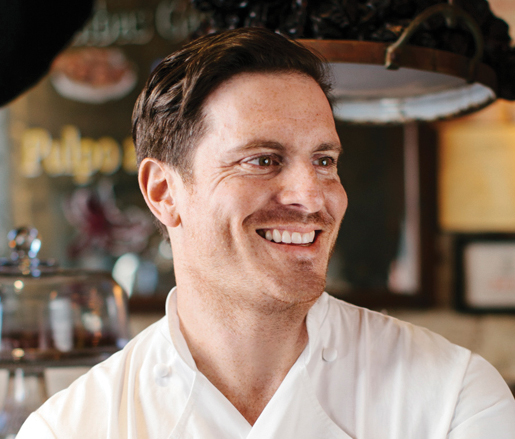Food Rx: Seamus Mullen's Struggles and Triumphs with Food and Health
Seamus Mullen
Seamus MullenOctober 06, 2014

The 2014 JBF Food Conference, taking place October 27–28 in New York City, will explore the intersection of food and health. Our speakers and panelists will discuss the myriad ways in which food supports personal and public health; fails to deliver on the promise of better health; and both drives and responds to other cultural forces in America today.
In anticipation of this two-day event, we're holding Health Month here on the JBF blog. Below, JBF Award–nominated chef Seamus Mullen shares his own complicated history with food and its impact on his well-being. Mullen will also be co-creating the menu for our 2014 JBF Leadership Awards dinner on October 27 in New York City.
--
As a chef, my job is to take ingredients, gussy them up, sell them, and, hopefully, be the catalyst for joy for the folks who are eating these ingredients. I believe that developing a relationship with our food is a basic level of joy that we all deserve to experience. You might assume that I, as a chef, have always enjoyed an innately positive relationship with food, but that couldn’t be further from the truth.
I was born healthy and I was a super-healthy kid. As a young adult, I got very sick and spent most of my 20s and all of my 30s suffering, and then improved. I’m incredibly happy (joyous even!) that now, at 40, I feel healthier than I can ever remember. This is my story with food: food gave me health, food made me sick, and food—real food—enabled me to reclaim my health.
I grew up on a small family farm in Vermont. My parents followed biodynamic farming principles and the vast majority of what we ate was self-produced. I ran around barefoot, milked cows and goats, and made cheese and yogurt with my mom and grandmother. Our very small town had no public high school and I was fortunate to receive a scholarship for boarding school in Massachusetts. And so began my initial exposure to industrial, institutional food and my slow decline from “wellness” to “hellness.”
When I was 16 there was an outbreak of salmonella in my school and 40 kids got sick. I was one of them and for the next several years I never really recovered. Just when I was beginning to feel a little better, I got sick again. This pattern would repeat itself over the course of the next ten years, each time getting progressively worse, each time my mysterious symptoms getting more complex and severe, each time my hospitalizations getting longer and scarier.
Eventually I was diagnosed with rheumatoid arthritis, an autoimmune disease of chronic inflammation that I believe, in my case, was brought on by a series of infections from garbage food. I lived with this disease, struggling and suffering through several more hospitalizations, throughout my 30s. It was my grandmother who finally helped me find the right path. She told me, in her stern English accent, “You must consider the effect food has on your disease!” And, as is always the case with grandmothers, she was infallibly correct.
It was not an overnight path to health, but over the course of 18 months, with the help and guidance of a wonderful doctor, I managed to get off all the powerful medications I had been on for years, to become physically active again and drop 50 pounds, and, most importantly, to watch all my blood markers for RA recede and eventually disappear to the point where there are no longer any signs of the disease in my blood.
One of the key paths to wellness involves real, accessible food. It’s real food that has helped me reclaim my own health and it’s real food that’s at the heart of the joy I hope to share through my cooking. You can’t make good food with crap ingredients.
I know there’s no silver bullet, but I have discovered that some foods can make dramatic differences. These foods have become my heroes. Elemental things like good meat, eggs, carrots, greens, and berries. I’m not a nutritionist—I’m a chef. And I’m not willing to let so-called health food take the place of great food.
I’m extremely fortunate to live in New York City. There is no shortage of small batch, artisanal food products made from exceptional ingredients for me to choose from. But this is the exception, not the rule. When I travel outside of New York, I realize how spoiled I am and just how challenging it can be to find food, real food, in great swaths of this amazing country. Our challenge is to turn the tides and return real food to every corner of the world. Access to good, real food should be a right and not a privilege.
This brings us back to joy. For too long, “healthy” food has suffered (often rightfully so) from the stigma of being un-delicious. Where is the joy in a microwaved tempeh burger? I certainly can’t find it. The joy is in real foods, made from real ingredients that benefit us in real ways. This is something that I believe in and pursue in both my professional and personal life. I make a point of not eating anything that isn’t both delicious and healthy. And when you do that, there’s joy.
--
For more information on how Mullen improved his health through food, as well as guidance and recipes, pick up a copy of his cookbook, Hero Food.



-57 web.jpg)


